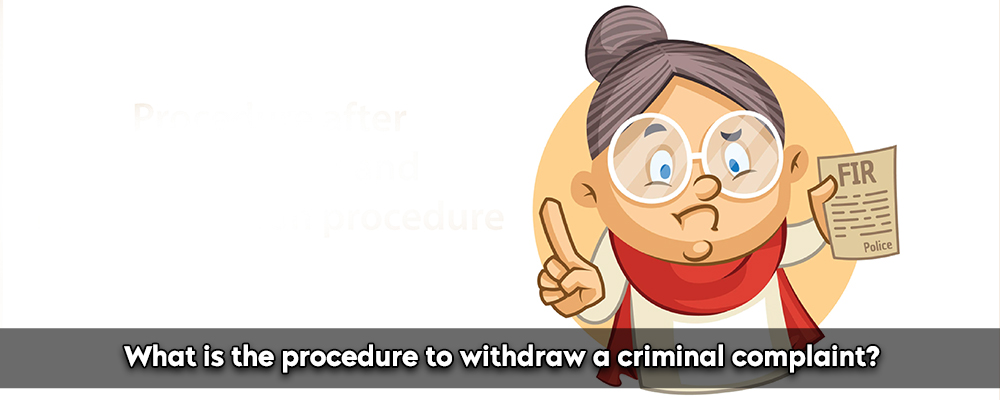When a court’s order or judgment, from which an appeal or review would not be possible in another court, renders a final decision, the proceedings are said to have been terminated. There is no explicit clause in the CrPC that specifies the conclusion of the criminal process. As a result, it becomes necessary to deduce the end of the proceedings from different Code sections. For example, if the complainant withdraws the complaint by Section 257, this will terminate the proceedings and the criminal case.
Need A Legal Advice
The internet is not a lawyer and neither are you. Talk to a real lawyer about your legal issue

Removal of the complaint from the case file
A complainant has the right to withdraw a complaint under Section 257. Before the final order is issued, it can be completed. If the complainant convinces the magistrate that there are good reasons not to press charges against the accused, and if the magistrate is pleased with the complainant’s defense, he may permit the complainant to withdraw his complaint and exonerate the accused. Section 300 of the CrPC states that an accused person cannot be tried for the same offense again after being found not guilty. Therefore, the proceedings for the offense for which the accused was found not guilty would come to an end if he was acquitted under Section 257. Section 257 covers only cases involving summonses.
- All complaints that are triable as summons cases may be withdrawn by Section 257.
- The court’s approval is required under Section 257 to withdraw the complaint.
- The prosecution of the accused will not immediately end if the complainant withdraws their complaint. An order of absolution, or the release of the accused from the charges, must be issued by the court.
- The accused does not need to give their consent for the complaint to be withdrawn.
Authority to halt proceedings in specific situations
According to Section 258 of the CrPC, the Chief Magistrate’s prior consent is required before the First-Class Magistrate in summons cases can halt the trial at any point without rendering a verdict. The magistrate is required to record the primary witness’s evidence before adjourning the case. The magistrate can then declare the case to be dismissed and record the reasons why.
Withdrawal from prosecution
The public prosecutor has extensive authority to end the prosecution under Section 321 of the Code of 1973. With the court’s approval, the public prosecutor may decide to step down from the case. According to Section 321(b), the accused is presumed to be exonerated if the public prosecutor recuses himself or herself after the charges are made. As the state’s representative, the public prosecutor has an obligation to the general public. Consequently, the public prosecutor cannot decide to drop all charges on his own; he must first confer with the appropriate State.
The Supreme Court clarified in the seminal case of Sheonandan Paswan v. State of Bihar (1986) that the public prosecutor should use his judgment and not be constrained by the state’s viewpoints. A public prosecutor is an agent of the State, not an independent judicial officer, as noted by the Apex Court. Before using Section 321 authority, the public prosecutor must abide by a few guidelines provided by the Supreme Court.
Following the state government’s advice, public prosecutors ought to do the following:
- Following the government’s advice, the public prosecutor should use his judgment to determine whether to proceed or to resign.
- In court, the public prosecutor must be able to demonstrate that his choice was made using only reason.
- Ultimately, the Public Prosecutor serves as both an agent of the State and an officer of the Court. As a result, the government advises that he must work.
The accused’s acquittal and the prosecution’s withdrawal are the primary ways in which the proceedings end. On the other hand, the proceedings conclude in various other ways. The judiciary’s goal is to end proceedings by guaranteeing the trial’s conclusion so that citizens can be guaranteed justice and new cases can be swiftly taken up.
Lead India provides a variety of legal services, including free legal advice and online information. Here, you can ask a legal question and talk to a lawyer.





 Talk to a Lawyer
Talk to a Lawyer